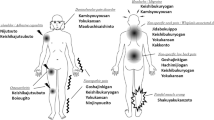Abstract
Traditional Japanese medicine, Kampo, is used by over 80% of medical doctors in Japan. Owing to its high quality and safety, Kampo has been integrated into modern medicine, and there are 345 randomized controlled trials using Kampo in Japan as of 2010. Although there are a number of articles in top journals about basic science research, we can find only small numbers of high-quality clinical evidence. Since undergraduate education on Kampo has been established, integrative approach with the balanced combination of modern medicine and Kampo is expected to generate good clinical evidence in the near future.
Similar content being viewed by others
References
Tsutani K. The evaluation of herbal medicines: an east Asian perspective. In: Lewith GT, Aldridge D, eds. Clinical research methodology for complementary therapies. London: Hodder & Stoughton;1993:365–393.
Motoo Y, Arai L, Hyodo I. Tsutani K. Current status of Kampo (Japanese herbal) medicines in Japanese clinical practice guidelines. Complement Ther Med 2009;17:147–154.
Chen KJ, Jiang YR. Current status and problems in developing clinical guidelines for Chinese medicine and integrative medicine. J Chin Integr Med 2009;7:301–305.
Lai SL, Wu DR, Lao YR. Scientific principles and rigorous processes should be followed in developing clinical guidelines for therapeutic interventions of integrative medicine. Chin J Integr Med 2008;14:3–5.
Takeda H, Sadakane C, Hattori T, Katsurada T, Ohkawara T, Nagai K, et al. Rikkunshito, an herbal medicine, suppresses cisplatin-induced anorexia in rats via 5-HT2 receptor antagonism. Gastroenterology 2008;134:2004–2013.
Yakabi K, Kurosawa S, Tamai M, Yuzurihara M, Nahata M, et al. Rikkunshito and 5-HT2C receptor antagonist improve cisplatin-induced anorexia via hypothalamic ghrelin interaction. Regul Pept 2010;161:97–105.
Moher D, Schulz KF, Simera I, Altman DG. Guidance for developers of health research reporting guidelines. PLoS Med 2010;7:e1000217.
Author information
Authors and Affiliations
Corresponding author
Rights and permissions
About this article
Cite this article
Motoo, Y., Seki, T. & Tsutani, K. Traditional Japanese medicine, Kampo: Its history and current status. Chin. J. Integr. Med. 17, 85–87 (2011). https://doi.org/10.1007/s11655-011-0653-y
Received:
Published:
Issue Date:
DOI: https://doi.org/10.1007/s11655-011-0653-y




